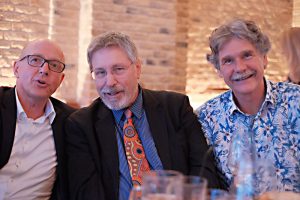Introduction to Pesso Boyden System Psychomotor®
The sequence of becoming: “every feeling is an interactive wish”, Albert Pesso
Introduction to Pesso Boyden System Psychomotor® – an interactive approach to emotional reeducation in Psychotherapy, Dance and Arts
Date: April 1 – 3 (Thursday – Sunday)
Time: 12:30- 15:00 (Berlin time), 7,5 hours in total
Format: Online (Zoom)
Presented PBSP Institute (Germany) and Inspirees Institute (China), the two founding members of IACAET.
Introduction
Pesso Boyden System Psychomotor® (PBSP®) is one of the most current and most advanced humanistic psychotherapies of the present.
Bessel van der Kolk, one of the most well-known experts in Research and Psychotherapy of Trauma says about this work:
In my experience, physically re-experiencing the past in the present and then reworking it in a safe and supportive “container” can be powerful enough to create new, supplemental memories (….) in which your basic human needs are met and your longings for love and protection are fulfilled.” (Bessel van der Kolk, The Body Keeps The Score, page 300)
“Al Pesso, a master therapist from the USA, shows us how the language of trauma and recovery transcends any language and culture, and that it is possible to convey a sense of security and protection to even severely traumatized people. A remarkable achievement.”
“Immediately I felt a deep relief in my body – the tension in my chest disappeared, and my breathing became more relaxed. At that moment I decided to become Pesso’s disciple.”
(Bessel van der Kolk)
Here is the uniqueness of this method. Albert Pesso, the Co-Founder of PBSP® is considered to be the pioneer of body based corrective emotional experiences in Psychotherapy worldwide. He was originally a professional dancer who was inspired by the dance and body work, and eventually developed the PBSP methods with his wife Diane Boyden Pesso.
Michael Bachg is a student of Albert Pesso. Both collaborated in PBSP® Training Programs for more than 20 years.
In this 3-day webinar students will explore some basic theories and the application of PBSP® principles and techniques, such as evolutionary memory, developmental theory and basic needs, self-development and ego-wrapping by interaction, microtracking of present consciousness, trauma, holes in roles and the creation of new synthetic body based memories.
Methods: lectures, demonstrations, role-play and exercises in duets or subgroups in breakout sessions.
 Michael Bachg (left) with Bessel van der Kolk (center) in Symposium Osnabrück 2018
Michael Bachg (left) with Bessel van der Kolk (center) in Symposium Osnabrück 2018
Goal
The primary goal of this course is to develop a beginning understanding of how consciousness and perception of the present is influenced by the unconscious memories of the past at body and mind level, and demonstrate how to address and change memories of pain and neglect. This introductory course will prepare the participants to apply for the full certification program of PBSP® professional trainings.
Objectives
After completing this course students will be able to:
- Understand basic theories and do first steps in applying PBSP® intervention, principles and techniques with their clients.
- Witness and understand how PBSP® can be used in individual and group intervention
- Understand how PBSP® can be integrated in your style, supplemented as a robust approach for effective intervention
Course Outline
- Day One Introduction of PBSP, basic theories and interventions. Emotional corrective experience in the three dimensional space: the antidote exercise, demonstration and practice in subgroups.
- Day Two Micro-tracking of present consciousness in PBSP®, affects and emotions in facial expression, voice, movements and body posture; recognize and deal with defense mechanisms
- Day Three The power of language: Transference and Projection – the Externalization of the client’s association field; therapeutic alliance in PBSP®, working with trauma; Introduction of a full PBSP® Training Program.
Trainer
 Michael Bachg, Certified PBSP Therapist, Supervisor, & Trainer. PBSP-Trainer and Coordinator for PBSP-Trainings, Institut für Fort- und Weiterbildung in PBSP und feeling-seen. Diplom-Psychologe, Psychologischer Psychotherapeut und Kinder- und Jugendlichenpsychotherapeut. Diplom-Psychologe, Westfälische-Wilhelms-Universität Münster.
Michael Bachg, Certified PBSP Therapist, Supervisor, & Trainer. PBSP-Trainer and Coordinator for PBSP-Trainings, Institut für Fort- und Weiterbildung in PBSP und feeling-seen. Diplom-Psychologe, Psychologischer Psychotherapeut und Kinder- und Jugendlichenpsychotherapeut. Diplom-Psychologe, Westfälische-Wilhelms-Universität Münster.
“I offer and teach PBSP in my private practice, the PBSP Institute and in other institutions. As a humanistic based method it helps me to assist Individuals, groups and organizations in the ongoing process of growing and developing. I appreciate the basic assumption that accurate interaction with the outside world is the foundation of the development of the true self. By that, personal development is always embedded into the world of interpersonal relationships to other human beings. That leads to a mature form of autonomy in which we see and experience our self as one among others, brothers and sisters, who share responsibility for the integrity of creation. By integrating PBSP into my work with children and families, which I have for more than 25 years, I created a complete new form of body-oriented child and family therapy which I called Feeling-Seen. My special interests and expertise are leading workshops and training groups in PBSP and Feeling-Seen, research, and creating new products.”
Testimonials
Feedback from colleagues from China in 2020
这次督导老师给了我一个角度去看到自己的不足,同时派索的督导部分呢,让我能确定我的工作方向是否正确的我看到自己的方向是正确的,只是需要更加的细致和深入,这一点是能够带给我启发的。 可惜时间实在是有点短。 希望下一次老师在督导的时候能够结合我的个案材料给予一个个案的概念化,这次老师给予的,好像是下一步的工作,希望给予一个未来深入处理来访者主题方向的可能性,同时能够说明这个方向的背后支撑的理论。
I’m really interested in PBSB, especially the idea of creating an ideal person. I think it’s a very effective model. For me, the fact that the patients we take in inpatient are less aware of their bodies makes it difficult. They struggle to imagine or feel an ideal object. Thus, only by talking about this ideal figure, only little emotional changes are effected in the patient. That is why I consider skills in this area to be particularly important and I would like to learn more about this structure. If Michael comes to Beijing in the future, I would love to attend his seminar.”







